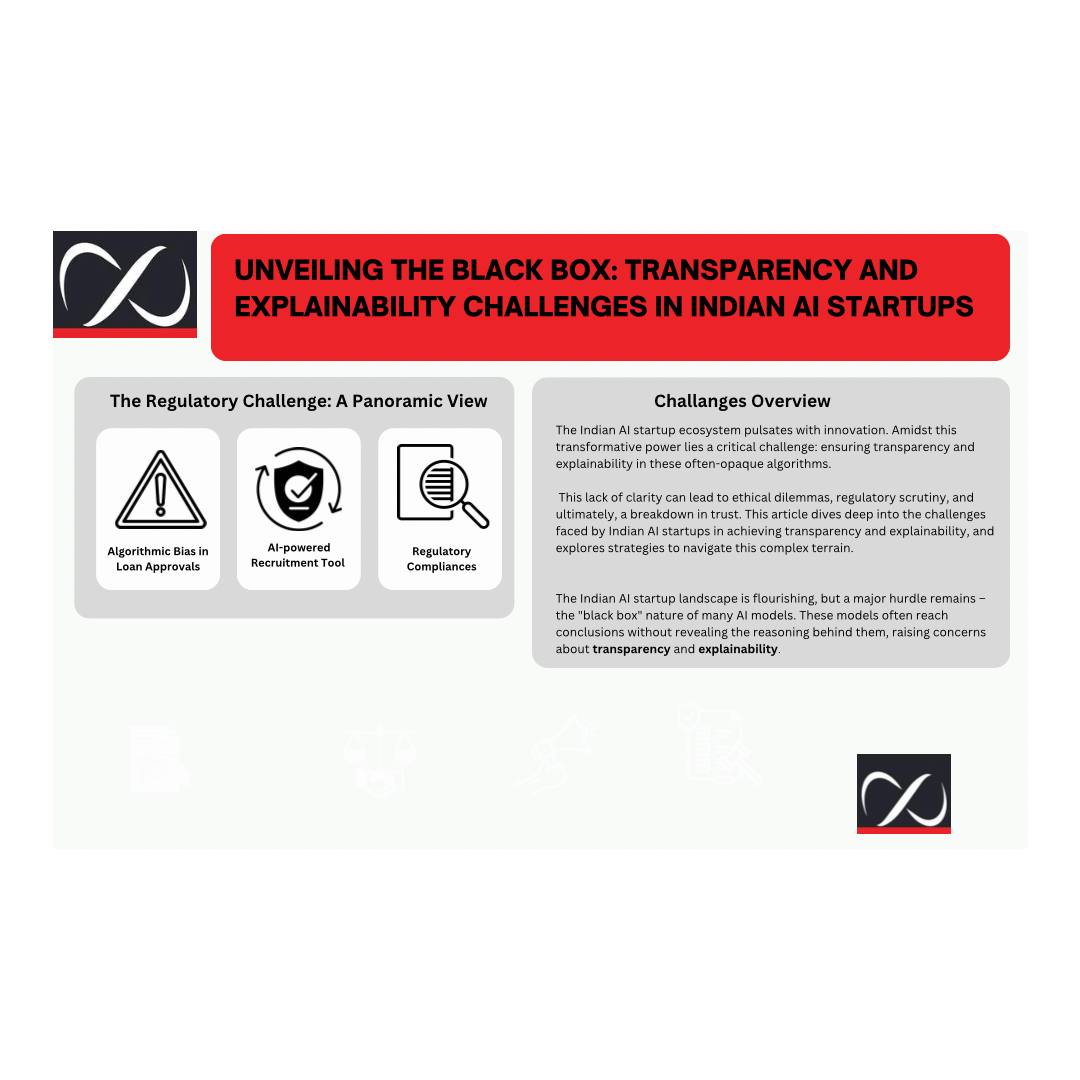
The Indian AI startup ecosystem pulsates with innovation. Amidst this transformative power lies a critical challenge: ensuring transparency and explainability in these often-opaque algorithms. This lack of clarity can lead to ethical dilemmas, regulatory scrutiny, and ultimately, a breakdown in trust. This article dives deep into the challenges faced by Indian AI startups in achieving transparency and explainability, and explores strategies to navigate this complex terrain.
The Indian AI startup landscape is flourishing, but a major hurdle remains – the “black box” nature of many AI models. These models often reach conclusions without revealing the reasoning behind them, raising concerns about transparency and explainability. Two recent Indian cases illustrate this challenge:
Case 1: Algorithmic Bias in Loan approvals
A Mumbai based fintech startup (The Company) with the annual revenue of Rs. 20 Crores was accused of algorithmic bias in its loan approval process. Borrowers from certain demographics consistently received loan rejections despite seemingly good creditworthiness. Upon investigation, it was discovered that the AI model, trained on historical loan data, had perpetuated societal biases present in that data. The lack of transparency in the model’s decision-making process made it difficult to pinpoint the exact cause of the bias, hindering efforts to rectify it.
Case 2: AI-powered Recruitment Tool Raises Concerns
A leading recruitment firm deployed an AI tool to shortlist candidates. However, job seekers from certain universities or with non-traditional career paths reported being unfairly filtered out. The firm, unable to explain the AI’s decision-making process due to the model’s complexity, faced criticism for a lack of transparency. This incident highlighted the potential for AI to exacerbate existing inequalities in the job market.
These cases underscore the urgency for Indian AI startups to prioritize transparency and explainability in their models. Here’s how they can move forward:
- Explainable AI (XAI) Techniques: Investing in XAI research can help explain how AI models arrive at decisions. This allows developers to identify and rectify biases within the algorithms themselves.
- Human-in-the-Loop Systems: Integrating human oversight into AI decision-making processes can provide a crucial safety net. Humans can review AI recommendations and intervene if necessary.
- Data Diversity and Fairness Audits: Using diverse datasets for training AI models and conducting regular fairness audits can help mitigate bias from the outset.
The Looming Shadow: Regulatory Landscape and Compliance Needs
The regulatory landscape surrounding AI in India is still evolving. However, regulatory bodies are increasingly emphasizing the need for transparency and explainability in AI systems. This stems from concerns about potential biases baked into algorithms, leading to discriminatory outcomes. For example, an AI-powered loan approval system trained on biased data sets could unfairly disadvantage certain demographics. Similarly, in recruitment, an AI tool might inadvertently screen out qualified candidates based on irrelevant factors.
To navigate this evolving regulatory landscape, Indian AI startups must be proactive. Regularly engaging with regulatory bodies, staying updated on the latest guidelines, and actively seeking clarification on specific requirements are crucial steps. Embracing transparency as a core principle from the very beginning demonstrates a commitment to responsible AI development and helps preempt potential regulatory disputes in the long run.
Beyond Regulations: Building Trust in a Diverse Nation
Generic explanations may not resonate with the diverse user base. For instance, an AI-driven healthcare diagnosis system might need to provide explanations tailored to a patient’s educational background and cultural context.
Furthermore, ensuring fairness and inclusivity in AI decision-making processes is paramount. Imagine an AI-powered recommendation engine for educational resources that inadvertently favors privileged populations due to data biases.Indian AI startups must be mindful of these potential pitfalls and tailor their transparency efforts to resonate with the values and beliefs of diverse communities. By fostering trust through clear communication and user empowerment,startups can build a loyal customer base and establish themselves as leaders in responsible AI development.
Embracing Transparency: Strategies for Sustainable Growth
Achieving transparency and explainability in AI requires a multi-pronged approach:
- Prioritizing Ethical AI Frameworks: Embedding ethical principles like fairness, accountability, and transparency into the very fabric of AI development is critical. Adopting existing ethical AI frameworks, such as the Montreal Declaration for Responsible AI, can serve as a valuable starting point. These frameworks provide guidelines for responsible data collection, algorithm development, and deployment.
- Investing in Explainable AI Techniques: Investing in research and development of explainable AI (XAI) techniques is key. XAI methodologies shed light on how AI models arrive at their decisions, allowing users to understand the rationale behind an AI recommendation or prediction. This can be achieved through model-agnostic and model-specific techniques, such as feature importance analysis and counterfactual explanations.
- Transparency by Design: Transparency needs to be built into the design and development of AI systems from the get-go. This involves designing systems that are easily auditable and allow for human oversight and intervention where necessary. Additionally, providing users with clear explanations of how their data is used in the AI development process is essential for building trust.
- User Education and Empowerment: Empowering users to understand and interact with AI systems is vital. This can be achieved through providing user-friendly interfaces that explain AI functionalities in simple, easy-to-understand language. Offering avenues for users to question AI decisions and provide feedback adds another layer of transparency and allows for continuous improvement of AI models.
Bridging the Gap: Towards a Transparent Future for Indian AI
Don’t let legal hurdles slow your mission to build a transparent and responsible AI future for India! Partnering with the right legal team is crucial for navigating the complexities of this evolving landscape. Here’s how to bridge the gap between your AI startup and the legal expertise you need:
- Seek Specialized Counsel: Look for lawyers with a proven track record in AI and emerging technologies. Their understanding of the legal nuances surrounding data privacy, intellectual property, and algorithmic bias will be invaluable in shaping your legal strategy.
- Open Communication is Key: Ensure complete transparency with your legal team. Share your vision for “Bridging the Gap: Towards a Transparent Future for Indian AI” and provide them with a clear understanding of your AI’s functionalities and data practices. This fosters trust and empowers them to provide the most relevant legal advice.
- Proactive Collaboration: Don’t wait for legal issues to arise before seeking counsel. Involve your lawyers early on in the development process. This collaborative approach allows them to identify potential risks and develop legal frameworks that support your AI’s ethical and responsible development.
- Embrace Continuous Learning: The legal landscape surrounding AI is constantly evolving. Work with lawyers who are committed to staying abreast of the latest regulations and legal developments. This ensures your AI startup remains compliant and future-proof.
- Invest in Building a Long-Term Partnership: The best lawyer-client relationships are built on trust and mutual respect. Look for lawyers who share your values and vision for a transparent and responsible AI future. This long-term partnership fosters a collaborative environment where legal expertise seamlessly integrates with your AI development journey.
By following these steps, you can bridge the gap between your AI startup and the legal expertise needed to navigate the exciting yet complex world of AI in India. With the right legal team by your side, you can turn your vision of “Bridging the Gap: Towards a Transparent Future for Indian AI” into a reality, building trust and shaping a responsible future for AI in India. Remember, legal advice is an investment, not an expense. It empowers you to innovate with confidence and pave the way for a brighter AI future. Take the first step today and secure the legal guidance your AI startup needs to thrive!











